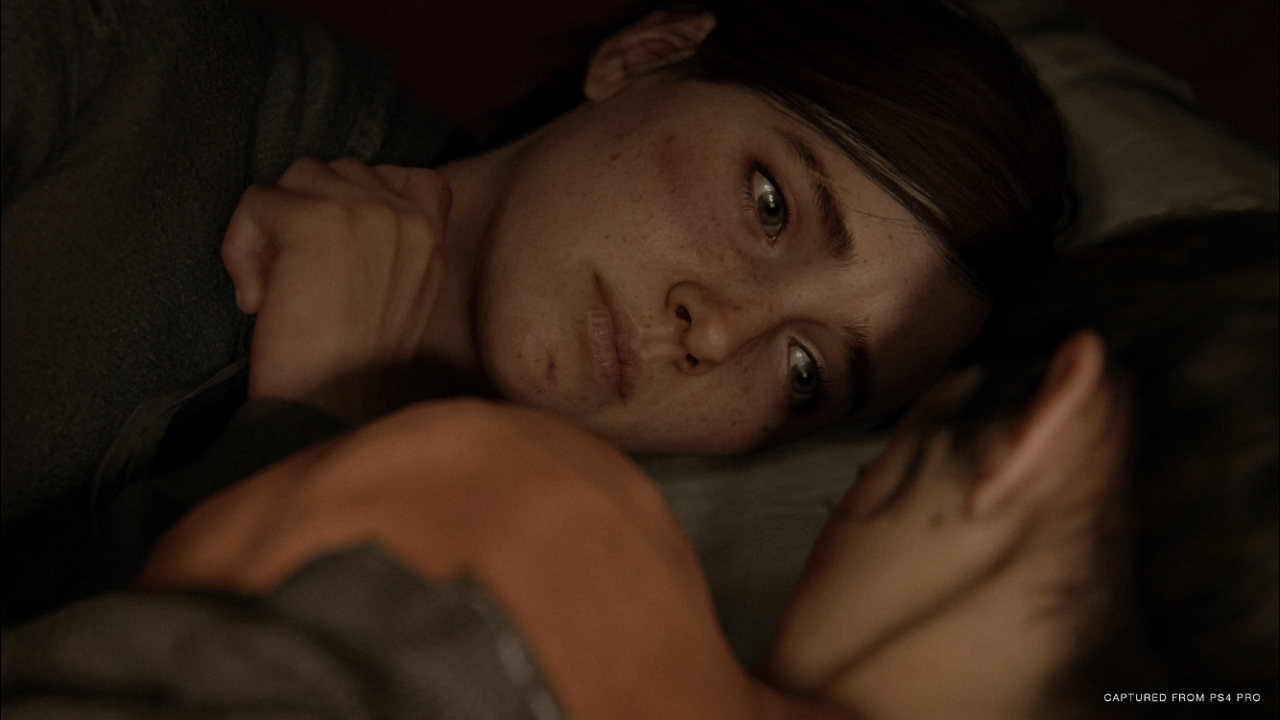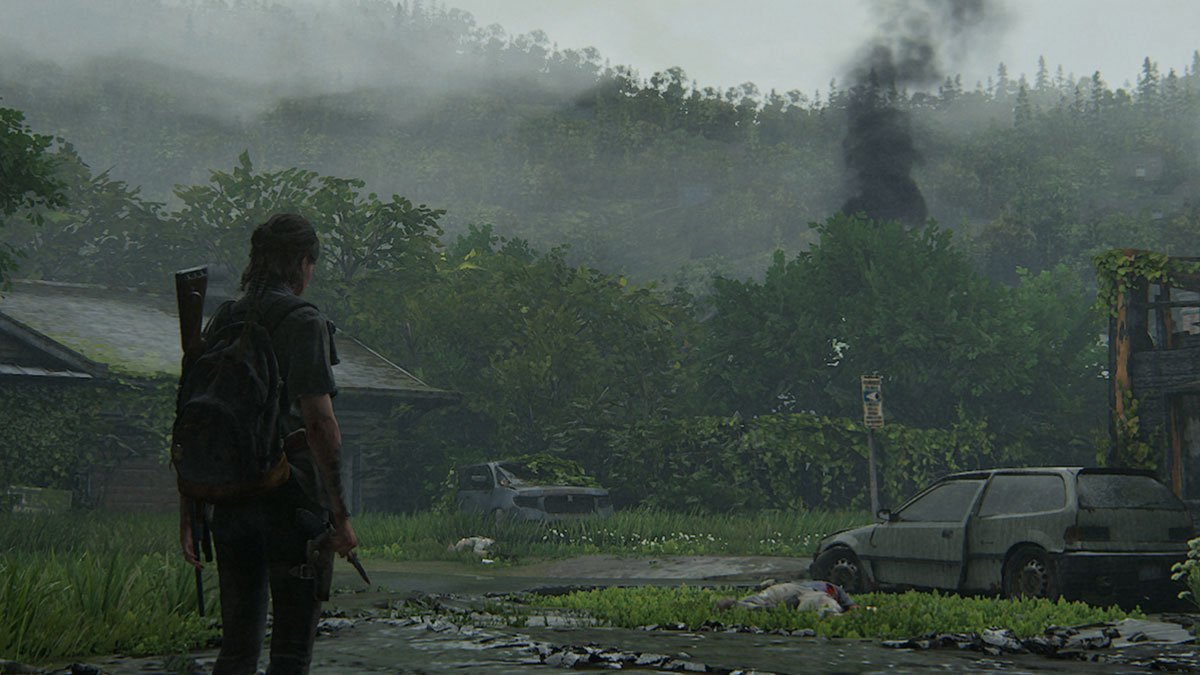Released: June 2020
Rating: M (Blood and Gore, Intense Violence, Nudity, Sexual Content, Strong Language, Use of Drugs)
It’s been seven long years since Naughty Dog gave the world the gift of The Last of Us. The survival horror game set with a zombie apocalypse backdrop defined the previous era of gaming with the greatest leap towards playable cinema and told a story so effortlessly profound and touching that it seemed a nigh-on impossible task to follow. Fortunately for everyone, after spells of lengthy delays since a sequel was officially announced in 2016, The Last of Us Part II is finally here in all it’s blood and tear-soaked glory.
Set five years after the original game, The Last of Us Part II continues Ellie and Joel’s story after settling in a housed community in Jackson, Wyoming. After a cataclysmic event early on that shakes the player to the core, the emotional crux of the story is formed and the player embarks on a perilous journey of revenge, this time around playing the majority of the game as Ellie.
In the first game, the few opportunities the player was given to play as Ellie were certainly a challenge, given her comparatively small stature and physical prowess as a 14-year-old. In The Last of Us Part II, Ellie is now 19 and is infinitely more powerful, but given much greater challenges. The game’s focus on stealth, athleticism, and quick-thinking make playing as Ellie arguably more fun than playing as Joel in the original, especially given the variety of movements and play-styles in Part II. The new abilities to go prone, jump, and dodge whilst retaining the clever listening-mode feature gives combat scenarios an entirely different, but ultimately refreshing feel.
Though the player is able to do more as Ellie this time around, this is met with a much greater challenge in almost every way. Where the original game might have you fighting anywhere from five to ten enemies at once, the seemingly endless waves of enemies you face in Part II really asks a lot of the player, and questions their playing style. Of course, you can always go in all guns blazing; whilst any good player should be able to scrape their way through a skirmish in this fashion, this game always finds a way to get you, so you must constantly be on your guard. Considering Part II is also much bigger than its predecessor, the fights are more frequent and the tension reaches insane new heights. You’ll often find yourself playing deadly games of cat and mouse with enemies that lurk around every corner. Ellie spends most of the game on her own, which really leaves you, as a player, feeling much more vulnerable than you did in the first game, but this is perfectly reflective of how the game’s wonderful story plays out.

Without giving too much away, much like the first game, the story goes right for the throat from the get-go, or should I say, the heartstrings. Before you’ve even figured out the new controls and way to play, Part II goes for the emotional jugular and the story finds itself continually evolving to consistently plumb every depth of emotion one might possess. The game fills in the gaps between the first game and this one with some heart-wrenching, guilt-inducing flashbacks that contribute heavily to the moral questions Part II asks of the player and its characters. Where the end of the first game left off, the player is always asked to look inward at their feelings about the consequences of their actions in-game and whether they’re truly a villain or a victim. This blurring of moral lines is one of the game’s crowning achievements, allowing you to feel every iota of Ellie’s pain whilst also being able to scrutinise her actions and the results they have on her character. Simply the greatest narrative achievement in gaming.
On a technical level, there is no game more impressive than this one. There is a sharp improvement on the physics of the first game which results in the aforementioned new physical abilities, making gameplay flow effortlessly. The combat also benefits greatly from the new mechanics, with the increased violence adding another deep layer to the game’s moral complexity. Equally, the intricacies on display in Part II are nothing short of stunning. Naughty Dog flex their muscles with seamless rope physics, crafting, and the weapon upgrade system. Workbenches are used like in the original, but this time around we actually see Ellie take apart her weapons and give them new additions – whilst this is a small detail, it is mightily impressive nonetheless. There are so many wonderful little elements like this scattered throughout the game, as well some more interactive elements that many players will absolutely relish.

Furthermore, the graphics alone are some of, if not the best that any console game can boast. Again, it is in the little details where said graphics are their most effective, with not only tiny things like the visible veins in characters’ arms and their facial expressions, but also the lush varieties of environments found whilst exploring Seattle.
Of course, you can’t talk about The Last of Us without mentioning the music. Once again, Gustavo Santaolalla has created an irresistible blend of tear-inducing, guitar-driven crescendos, and nail-biting, sinister sounds that accompany the gameplay and cinematics with enviable ease and make this game even more beautiful.
What’s also incredible about this game, and the original, is the ability of the actors – with their motion-capture performances arguably as good as any cinematic performance you might find. Ashley Johnson anchors the game as Ellie, deep-diving into the character’s emotional spectrum and producing a performance steeped in nuance. Her chemistry with every other character is effortless as she retains that tongue-in-cheek charm from the first game that helps mask her obvious pain. Troy Baker shines in all of his screen time as Joel, and there are equally great performances from Shannon Woodward, Jeffrey Pierce, Stephen Chang and Laura Bailey as Dina, Tommy, Jesse and the mysterious Abby respectively.
The Last of Us Part II not only matches everything that the original did, but in every way surpasses it. The increase in scale and stakes of the game are coupled with sublime technical advances, from effortlessly slick mechanics to gorgeous graphics and music. The story is steeped in humanity and moral complexity, so richly layered and emotionally nuanced, driven by performances that make it impossible not to shed a tear on multiple occasions. It’s a game that can change your outlook as easily as any film, TV show, or piece of music and represents everything beautiful about gaming.
A masterpiece.
Final Verdict: 10/10
Words by Elliott Jones
